As regulations to legalize dockless electric scooters and bicycles in Richmond make their way through City Hall, questions remain as to the effectiveness and fate of the city’s own bike share program – particularly in light of other cities across the country scrapping similar programs in favor of the new arrivals.
The latest version of a proposal to amend city code to allow electric scooter and bike startups such as Lime, Bird and Uber Jump to operate locally was scheduled to go before City Council on Monday night but was continued to Jan. 28, reinitiating a process that could see the dockless vehicles permitted and on city streets and sidewalks come spring.
By then, Richmond also could see the rollout of a delayed expansion of its docked bike share program, RVA Bike Share, which has met with mixed reviews since launching 18 months ago.
Mayor Levar Stoney, who is driving the code amendments, said a planned second phase that was anticipated last year is slated to roll out “in coming weeks,” doubling the program’s initial wave with an additional 220 bikes and 20 dock stations – expanding the system’s footprint and improving availability of bikes, access to which has been among the program’s recurring criticisms.
The $1.5 million expansion also would involve converting the entire 440-bike fleet to PedElec electric-assist models that can help riders with uphill climbs, in similar fashion to Lime and Uber Jump’s electric-powered bikes. The conversion would require connecting the 40 dock stations to a power grid for bike recharging.
New stations would be located as far as Carytown, Byrd Park, the Boulevard/Museum District and Manchester, expanding the program’s reach from its current, primarily downtown footprint.
Stoney said the pending arrival of Lime, Bird, Uber Jump and others is not affecting or taking away from RVA Bike Share. Rather, he sees them as options complementing each other, providing choices for people seeking alternative transportation to complete what’s referred to as the “last mile” of their travel.
“Our job is to provide multiple options for the rider, particularly for that first mile and that last mile,” Stoney said Friday. “That’s what we’re really doing with the bike share.
“I have seen people utilize this mode of transportation, and when you add dockless scooters and bikes to the options, I think it’s just going to give those individuals who choose to get around the city without a car more ways to do it, but in a safe manner,” he said.
‘Mixed results’
Since launching in August 2017, RVA Bike Share has logged more than 33,600 miles in 16,200 trips by more than 7,000 users, according to stats on its website that are updated continually.
In the works since 2012, during former mayor Dwight Jones’ administration, the program was launched with a $1.06 million grant awarded to the city in 2014 by the Federal Highway Administration’s Congestion Mitigation and Air Quality Improvement Program, along with $280,000 in capital improvement funding from the city.
Richmond contracted with Canada-based vendor Bewegen, which provides and maintains the eight-speed bikes that are managed by Corps Logistics. Richmond pays Bewegen $393,000 annually for operations and maintenance, and revenues are generated primarily by user fees, which range from $1.75 for a one-way trip under 45 minutes to $96 annual memberships.
Additional revenues come from branding and sponsorships from area businesses, such as CarMax’s sponsorship of the Canal Walk station in the program’s first year. Station kiosks also include advertising panels. One at the Abner-Clay Park station in Jackson Ward on Friday displayed an ad for VCU’s Institute for Contemporary Art.
It’s unclear how much revenue the program has generated since its launch, as the city did not provide numbers in response to requests from BizSense last week.
Jakob Helmboldt, who oversees RVA Bike Share as the city’s pedestrian, bicycle and trails coordinator, did not respond to multiple attempts from BizSense to reach him. Questions sent to Bewegen, the vendor, were deferred to Helmboldt.
Sharon North, spokeswoman for the public works department that includes RVA Bike Share, said revenue figures had yet to be determined and would be known after numbers “are reviewed and reconciled.” Requests for approximate or unaudited figures were not fulfilled.
Stoney said RVA Bike Share has performed comparably to similar programs in other cities. Bewegen’s website shows it supplies bikes to six other U.S. localities including Columbia, South Carolina, and Birmingham, Alabama. It also supplies bikes in Costa Rica and three localities in Europe.
“The program has produced mixed results, but what we’ve seen is comparable to what other cities have seen, cities of our size,” Stoney said. “I think there have been some positive results from the launch of the bike share. We have a Phase 2 that’s on its way, and that’s going to add to its success.”
Baltimore brakes
While Stoney said he is committed to seeing the RVA Bike Share expansion through, other cities across the country have been pulling back on similar programs in favor of working directly with Lime, Bird and others.
In August, the City of Baltimore, which also worked with Bewegen to launch a comparably sized bike share in 2016, announced it was shutting down its Baltimore Bike Share program in favor of a dockless pilot program with Lime and Bird.
Last summer, Seattle, which permits three dockless bike shares to operate, amended its rules after ending its city-run bike share in 2017. Meanwhile, other programs such as Washington, D.C.’s Capital Bikeshare and Citi Bike in New York City have found success.
Baltimore’s decision followed a rash of bike thefts and other problems that plagued the city program and delayed a planned expansion, according to reporting by The Baltimore Sun. Bewegen and Corps Logistics shut down the program for a month to update the bikes with new locks and other upgrades, but the program continued to languish before Bird dropped a fleet of electric scooters in the city last June.
Baltimore announced it was partnering with Bird and Lime two months later – around the time that Bird scooters started showing up in Richmond.
The unannounced arrival was met with resistance from Richmond officials, who had the scooters impounded for violating city ordinances, which among other things restrict them from being parked on city sidewalks. By September, Stoney announced he would sponsor proposed changes to city code to allow dockless scooters and bikes to operate here legally.
New rules
The changes would allow operators to apply for an annual permit to park up to 500 scooters or bikes per permit on city sidewalks with a fee. The total number of vehicles that could be permitted at a time would be capped at 1,500.
A fee schedule included in the amendments has been further reduced from earlier proposals, with proposed fees now ranging from $20,000 per permit for up to 100 vehicles, $30,000 for between 101 and 200 vehicles, and $45,000 for 201 to 500.
Applicants would need to include commercial general liability insurance coverage of at least $3 million for each occurrence and at least $5 million in the aggregate.
While the amendments do not specifically restrict dockless vehicles from being ridden on city sidewalks, applicants are required to encourage users to ride on roads or in bike lanes. State law allows bicycles to be ridden on sidewalks unless prohibited by local ordinance, and Richmond has no such prohibition in place. Users would be required to have driver’s licenses.
Speeds would be limited to 10 mph, and operation would be limited to between sunrise and sunset. Each vehicle also would have to have a GPS unit, used to track and locate vehicles for users who use an operator’s app on their smartphone.
Vehicles parked on sidewalks would need to be parked in an upright position to reduce interference with pedestrians. Parking would not be allowed on shared-use paths, in city-owned parks or athletic fields, or against park benches on city property. Users would be required to take and submit a photo with their smartphone showing the vehicle is parked appropriately.
While the proposals work their way through council committees and potential adoption, state legislators also have introduced legislation aimed at authorizing dockless vehicles across the state, with localities allowed to modify rules further.
A pair of House bills – HB 2232 and HB 2214 – were introduced Wednesday by Del. Lamont Bagby (D-Richmond) and by Del. Jerrauld “Jay” Jones (D-Norfolk), and Sen. David Marsden (D-Burke), respectively. The bills would, among other things, allow vehicles to be operated and parked on sidewalks unless prohibited by the locality.
The bills would require vehicles traveling at speeds slower than traffic to travel as close to the curb or road edge as possible – on the right side for two-lane roads; either side for one-way. Localities would be allowed to set speed limits, and the bills call for starting fleet sizes of one vehicle per 1,000 residents, up to 500 vehicles, whichever number is greater.
Lime ready to roll
Ahead of the presentation to the council, city staff met Thursday with Maggie Gendron, regional development director for Lime, which has been working with Richmond on the proposed rules before dropping its bikes and scooters locally.
The San Francisco-based startup, which launched two years ago, is already active in Virginia, permitted to operate in Arlington, Charlottesville and Harrisonburg. Gendron, who previously worked for Vermont U.S. Sen. Patrick Leahy, said a challenge in working with localities on rules is trying to find the right fit with a technology and company that’s still developing.
“With regulations, we’re new, and it’s an innovative technology that I think cities are nervous about,” she said.
Gendron said one challenge is that localities often want to keep scooters and bikes off sidewalks but also restrict their speeds on roadways with faster-moving traffic. She said users often feel safer riding on sidewalks, though local laws may not allow that.
“They’re trying to understand how to regulate it within their city, and in the same frame, we’re trying to talk to cities to let them know what our business model is, what the technology is, let them try it, so people can break down some of the barriers of what they’re nervous about,” she said.
While Lime and Bird are working directly with Baltimore on that city’s pilot program, Gendron said Lime has not been pushing for the same program in Richmond.
“Every city is different. We don’t try to carbon copy. We don’t try to say the City of Baltimore did this and so we’re going to do the same thing in Richmond,” Gendron said. “We do have a set of regulations that we think are the best regulations both for the industry and the city, and typically the city modifies it based on what they’re looking for.”
Gendron would not disclose the cost to Lime to operate in a locality, citing competition from other operators. She said the proposal that had been scheduled to go before council Monday would be a good starting point for operating in Richmond.
“I think the amendments they’re going to offer are something we could work with,” she said.
Local scrutiny
While state and local rules are reviewed, the RVA Bike Share expansion appears to be a go after a delay last year, reported by the Times-Dispatch.
But not everyone’s on board with continuing the program as it’s performed thus far.
Councilmember Kim Gray, whose district includes the Abner Clay Park dock station, where she said attempted bike thefts have been reported to police, said she’d like to see stations relocated to better serve stops along the GRTC Pulse rapid transit bus line.
“If you want to have a network of bikes, you have to have enough locations for it to make sense for people to rent them. If I’ve got to go a distance to return it to a dock, it really isn’t economical, timewise or moneywise, if there aren’t enough docking stations within the area where I’m traveling,” she said.
Gray said she doesn’t see RVA Bike Share losing business to Lime, Bird or other dockless systems.
“I don’t think they’re competing or mutually exclusive of each other,” she said. “I think you can do both, but I think we need to learn from other localities and what kind of challenges they faced with implementation of either of these modes.”
The city did not provide specific bike theft numbers, though North, the public works spokeswoman, said the department had seen “a handful” of bikes stolen or lost, adding that in most cases those bikes have been recovered.
Brantley Tyndall, community engagement manager with Bike Walk RVA, said the advocacy group – part of nonprofit SportsBackers – sees room for improvement for the program but is looking forward to the expansion.
“We’re most excited about the expansion of stations,” Tyndall said, adding that the conversion to Pedelec bikes also will improve the program. “That will be a notable change to some people’s experience in how they use the bike share bikes, but from my observation, the bike itself is not so much the limiter; it’s where you can take it.”
As for the addition of dockless vehicles as options, Tyndall said, “The more the merrier.”
While Stoney said he’s aware of other cities pulling back or modifying their bike shares, in light of what’s been called the “micro-mobility revolution” sweeping across the country, he said the performance of RVA Bike Share would be reviewed and assessed – after the second-phase rollout.
“We will evaluate the results after Phase 2 is complete, and then from there, we’ll make some decisions whether or not the bike share program should still exist,” Stoney said. “If we see that the bike share program is not being utilized, we’ll make the necessary decisions to move forward.
“Until then, I think we’re going to see multiple options available to residents and visitors, and I think the market will actually allow us to move from there,” he said. “We’re not the only city in this country that will have a bike share program and also scooters as well. We’re giving the rider an option, and I think they both can coexist.”
Correction: Seattle ended its city-run bike share program in 2017, not last November as originally reported.
As regulations to legalize dockless electric scooters and bicycles in Richmond make their way through City Hall, questions remain as to the effectiveness and fate of the city’s own bike share program – particularly in light of other cities across the country scrapping similar programs in favor of the new arrivals.
The latest version of a proposal to amend city code to allow electric scooter and bike startups such as Lime, Bird and Uber Jump to operate locally was scheduled to go before City Council on Monday night but was continued to Jan. 28, reinitiating a process that could see the dockless vehicles permitted and on city streets and sidewalks come spring.
By then, Richmond also could see the rollout of a delayed expansion of its docked bike share program, RVA Bike Share, which has met with mixed reviews since launching 18 months ago.
Mayor Levar Stoney, who is driving the code amendments, said a planned second phase that was anticipated last year is slated to roll out “in coming weeks,” doubling the program’s initial wave with an additional 220 bikes and 20 dock stations – expanding the system’s footprint and improving availability of bikes, access to which has been among the program’s recurring criticisms.
The $1.5 million expansion also would involve converting the entire 440-bike fleet to PedElec electric-assist models that can help riders with uphill climbs, in similar fashion to Lime and Uber Jump’s electric-powered bikes. The conversion would require connecting the 40 dock stations to a power grid for bike recharging.
New stations would be located as far as Carytown, Byrd Park, the Boulevard/Museum District and Manchester, expanding the program’s reach from its current, primarily downtown footprint.
Stoney said the pending arrival of Lime, Bird, Uber Jump and others is not affecting or taking away from RVA Bike Share. Rather, he sees them as options complementing each other, providing choices for people seeking alternative transportation to complete what’s referred to as the “last mile” of their travel.
“Our job is to provide multiple options for the rider, particularly for that first mile and that last mile,” Stoney said Friday. “That’s what we’re really doing with the bike share.
“I have seen people utilize this mode of transportation, and when you add dockless scooters and bikes to the options, I think it’s just going to give those individuals who choose to get around the city without a car more ways to do it, but in a safe manner,” he said.
‘Mixed results’
Since launching in August 2017, RVA Bike Share has logged more than 33,600 miles in 16,200 trips by more than 7,000 users, according to stats on its website that are updated continually.
In the works since 2012, during former mayor Dwight Jones’ administration, the program was launched with a $1.06 million grant awarded to the city in 2014 by the Federal Highway Administration’s Congestion Mitigation and Air Quality Improvement Program, along with $280,000 in capital improvement funding from the city.
Richmond contracted with Canada-based vendor Bewegen, which provides and maintains the eight-speed bikes that are managed by Corps Logistics. Richmond pays Bewegen $393,000 annually for operations and maintenance, and revenues are generated primarily by user fees, which range from $1.75 for a one-way trip under 45 minutes to $96 annual memberships.
Additional revenues come from branding and sponsorships from area businesses, such as CarMax’s sponsorship of the Canal Walk station in the program’s first year. Station kiosks also include advertising panels. One at the Abner-Clay Park station in Jackson Ward on Friday displayed an ad for VCU’s Institute for Contemporary Art.
It’s unclear how much revenue the program has generated since its launch, as the city did not provide numbers in response to requests from BizSense last week.
Jakob Helmboldt, who oversees RVA Bike Share as the city’s pedestrian, bicycle and trails coordinator, did not respond to multiple attempts from BizSense to reach him. Questions sent to Bewegen, the vendor, were deferred to Helmboldt.
Sharon North, spokeswoman for the public works department that includes RVA Bike Share, said revenue figures had yet to be determined and would be known after numbers “are reviewed and reconciled.” Requests for approximate or unaudited figures were not fulfilled.
Stoney said RVA Bike Share has performed comparably to similar programs in other cities. Bewegen’s website shows it supplies bikes to six other U.S. localities including Columbia, South Carolina, and Birmingham, Alabama. It also supplies bikes in Costa Rica and three localities in Europe.
“The program has produced mixed results, but what we’ve seen is comparable to what other cities have seen, cities of our size,” Stoney said. “I think there have been some positive results from the launch of the bike share. We have a Phase 2 that’s on its way, and that’s going to add to its success.”
Baltimore brakes
While Stoney said he is committed to seeing the RVA Bike Share expansion through, other cities across the country have been pulling back on similar programs in favor of working directly with Lime, Bird and others.
In August, the City of Baltimore, which also worked with Bewegen to launch a comparably sized bike share in 2016, announced it was shutting down its Baltimore Bike Share program in favor of a dockless pilot program with Lime and Bird.
Last summer, Seattle, which permits three dockless bike shares to operate, amended its rules after ending its city-run bike share in 2017. Meanwhile, other programs such as Washington, D.C.’s Capital Bikeshare and Citi Bike in New York City have found success.
Baltimore’s decision followed a rash of bike thefts and other problems that plagued the city program and delayed a planned expansion, according to reporting by The Baltimore Sun. Bewegen and Corps Logistics shut down the program for a month to update the bikes with new locks and other upgrades, but the program continued to languish before Bird dropped a fleet of electric scooters in the city last June.
Baltimore announced it was partnering with Bird and Lime two months later – around the time that Bird scooters started showing up in Richmond.
The unannounced arrival was met with resistance from Richmond officials, who had the scooters impounded for violating city ordinances, which among other things restrict them from being parked on city sidewalks. By September, Stoney announced he would sponsor proposed changes to city code to allow dockless scooters and bikes to operate here legally.
New rules
The changes would allow operators to apply for an annual permit to park up to 500 scooters or bikes per permit on city sidewalks with a fee. The total number of vehicles that could be permitted at a time would be capped at 1,500.
A fee schedule included in the amendments has been further reduced from earlier proposals, with proposed fees now ranging from $20,000 per permit for up to 100 vehicles, $30,000 for between 101 and 200 vehicles, and $45,000 for 201 to 500.
Applicants would need to include commercial general liability insurance coverage of at least $3 million for each occurrence and at least $5 million in the aggregate.
While the amendments do not specifically restrict dockless vehicles from being ridden on city sidewalks, applicants are required to encourage users to ride on roads or in bike lanes. State law allows bicycles to be ridden on sidewalks unless prohibited by local ordinance, and Richmond has no such prohibition in place. Users would be required to have driver’s licenses.
Speeds would be limited to 10 mph, and operation would be limited to between sunrise and sunset. Each vehicle also would have to have a GPS unit, used to track and locate vehicles for users who use an operator’s app on their smartphone.
Vehicles parked on sidewalks would need to be parked in an upright position to reduce interference with pedestrians. Parking would not be allowed on shared-use paths, in city-owned parks or athletic fields, or against park benches on city property. Users would be required to take and submit a photo with their smartphone showing the vehicle is parked appropriately.
While the proposals work their way through council committees and potential adoption, state legislators also have introduced legislation aimed at authorizing dockless vehicles across the state, with localities allowed to modify rules further.
A pair of House bills – HB 2232 and HB 2214 – were introduced Wednesday by Del. Lamont Bagby (D-Richmond) and by Del. Jerrauld “Jay” Jones (D-Norfolk), and Sen. David Marsden (D-Burke), respectively. The bills would, among other things, allow vehicles to be operated and parked on sidewalks unless prohibited by the locality.
The bills would require vehicles traveling at speeds slower than traffic to travel as close to the curb or road edge as possible – on the right side for two-lane roads; either side for one-way. Localities would be allowed to set speed limits, and the bills call for starting fleet sizes of one vehicle per 1,000 residents, up to 500 vehicles, whichever number is greater.
Lime ready to roll
Ahead of the presentation to the council, city staff met Thursday with Maggie Gendron, regional development director for Lime, which has been working with Richmond on the proposed rules before dropping its bikes and scooters locally.
The San Francisco-based startup, which launched two years ago, is already active in Virginia, permitted to operate in Arlington, Charlottesville and Harrisonburg. Gendron, who previously worked for Vermont U.S. Sen. Patrick Leahy, said a challenge in working with localities on rules is trying to find the right fit with a technology and company that’s still developing.
“With regulations, we’re new, and it’s an innovative technology that I think cities are nervous about,” she said.
Gendron said one challenge is that localities often want to keep scooters and bikes off sidewalks but also restrict their speeds on roadways with faster-moving traffic. She said users often feel safer riding on sidewalks, though local laws may not allow that.
“They’re trying to understand how to regulate it within their city, and in the same frame, we’re trying to talk to cities to let them know what our business model is, what the technology is, let them try it, so people can break down some of the barriers of what they’re nervous about,” she said.
While Lime and Bird are working directly with Baltimore on that city’s pilot program, Gendron said Lime has not been pushing for the same program in Richmond.
“Every city is different. We don’t try to carbon copy. We don’t try to say the City of Baltimore did this and so we’re going to do the same thing in Richmond,” Gendron said. “We do have a set of regulations that we think are the best regulations both for the industry and the city, and typically the city modifies it based on what they’re looking for.”
Gendron would not disclose the cost to Lime to operate in a locality, citing competition from other operators. She said the proposal that had been scheduled to go before council Monday would be a good starting point for operating in Richmond.
“I think the amendments they’re going to offer are something we could work with,” she said.
Local scrutiny
While state and local rules are reviewed, the RVA Bike Share expansion appears to be a go after a delay last year, reported by the Times-Dispatch.
But not everyone’s on board with continuing the program as it’s performed thus far.
Councilmember Kim Gray, whose district includes the Abner Clay Park dock station, where she said attempted bike thefts have been reported to police, said she’d like to see stations relocated to better serve stops along the GRTC Pulse rapid transit bus line.
“If you want to have a network of bikes, you have to have enough locations for it to make sense for people to rent them. If I’ve got to go a distance to return it to a dock, it really isn’t economical, timewise or moneywise, if there aren’t enough docking stations within the area where I’m traveling,” she said.
Gray said she doesn’t see RVA Bike Share losing business to Lime, Bird or other dockless systems.
“I don’t think they’re competing or mutually exclusive of each other,” she said. “I think you can do both, but I think we need to learn from other localities and what kind of challenges they faced with implementation of either of these modes.”
The city did not provide specific bike theft numbers, though North, the public works spokeswoman, said the department had seen “a handful” of bikes stolen or lost, adding that in most cases those bikes have been recovered.
Brantley Tyndall, community engagement manager with Bike Walk RVA, said the advocacy group – part of nonprofit SportsBackers – sees room for improvement for the program but is looking forward to the expansion.
“We’re most excited about the expansion of stations,” Tyndall said, adding that the conversion to Pedelec bikes also will improve the program. “That will be a notable change to some people’s experience in how they use the bike share bikes, but from my observation, the bike itself is not so much the limiter; it’s where you can take it.”
As for the addition of dockless vehicles as options, Tyndall said, “The more the merrier.”
While Stoney said he’s aware of other cities pulling back or modifying their bike shares, in light of what’s been called the “micro-mobility revolution” sweeping across the country, he said the performance of RVA Bike Share would be reviewed and assessed – after the second-phase rollout.
“We will evaluate the results after Phase 2 is complete, and then from there, we’ll make some decisions whether or not the bike share program should still exist,” Stoney said. “If we see that the bike share program is not being utilized, we’ll make the necessary decisions to move forward.
“Until then, I think we’re going to see multiple options available to residents and visitors, and I think the market will actually allow us to move from there,” he said. “We’re not the only city in this country that will have a bike share program and also scooters as well. We’re giving the rider an option, and I think they both can coexist.”
Correction: Seattle ended its city-run bike share program in 2017, not last November as originally reported.
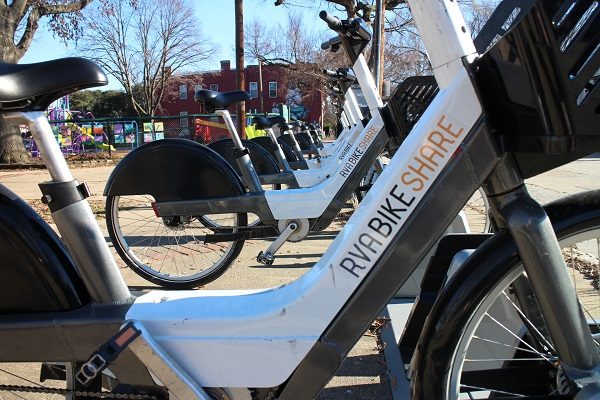
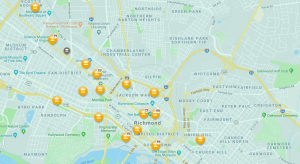
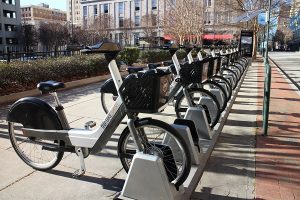
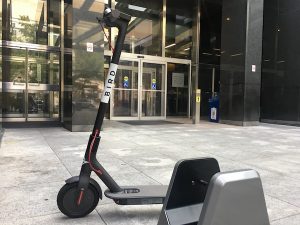
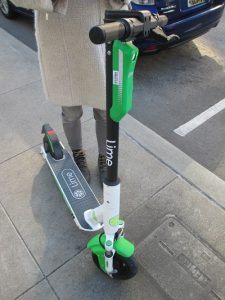
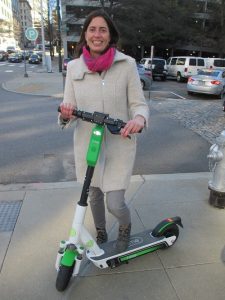

Kim has a good point on the bike and buses. Why is the bike station at Meadow and Broad, where NO bus stops exist, and not closer to the Pulse stop at Allison and Broad? As for monies, you all mentioned two stations but most stations and all the bikes have zero ads on them. I’m excited to see the roll out too but “weeks” generally means 4-6 weeks or less otherwise one would say “months.” And I live, work and play in Byrd Park, Carytown, the Fan, and the Museum District; anyone seeing any new docking stations being installed?… Read more »